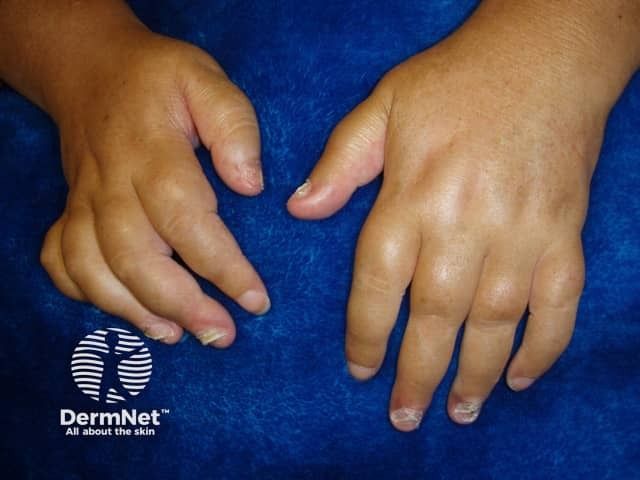- Case-Based Roundtable
- General Dermatology
- Eczema
- Chronic Hand Eczema
- Alopecia
- Aesthetics
- Vitiligo
- COVID-19
- Actinic Keratosis
- Precision Medicine and Biologics
- Rare Disease
- Wound Care
- Rosacea
- Psoriasis
- Psoriatic Arthritis
- Atopic Dermatitis
- Melasma
- NP and PA
- Skin Cancer
- Hidradenitis Suppurativa
- Drug Watch
- Pigmentary Disorders
- Acne
- Pediatric Dermatology
- Practice Management
- Prurigo Nodularis
- Buy-and-Bill
News
Article
Study Explores Gaps in Patient-Doctor PsA Priorities
Key Takeaways
- The study used patient focus groups and rheumatologist input to identify PsA concerns, revealing differences in patient and physician perceptions.
- Fatigue, sleep disturbance, and back pain were significant patient concerns, often underestimated by physicians.
Researchers found that PsA patients prioritize fatigue, sleep issues, and uncertainty, often ranking them higher than doctors do.
Recently, Philip Mease, MD, director of rheumatology research at Providence Swedish Medical Center in Seattle, Washington, led a comprehensive qualitative study aimed at understanding the concerns and priorities of psoriatic arthritis (PsA) patients. "What we did in this study was to conduct a series of 3PsA patient focus groups in Seattle, Cleveland, and Washington, DC," Mease explained in an interview with Dermatology Times. By engaging both patients and rheumatologists in discussions and rankings of disease impact, the study revealed critical insights into patient experiences and physician awareness.
Methodology: A Multi-Faceted Approach
The study involved multiple phases, starting with patient focus groups led by a medical anthropologist. These sessions helped identify key concerns from individuals of varying disease severity. Using qualitative research software, the collected data was transcribed and analyzed. Additionally, input was gathered from 13 expert rheumatologists through a Delphi exercise, which ranked the most significant disease-related issues from both physician and patient perspectives.
Concordance and Discordance in Disease Perception
Mease said the most revealing aspects of the study were the comparison between patient and physician priorities. Some issues, such as disease activity, pain, and fatigue, were universally acknowledged as major concerns. "Fatigue was very important, and it's something that accompanies many rheumatic diseases," Mease noted. However, the study also highlighted discrepancies in how patients and doctors ranked other symptoms.
For example, sleep disturbance was a significant issue for patients but ranked lower by physicians. "Patients reported that sleep was a big issue for them, and their quality of sleep was not good, partly because of pain waking them up," Mease stated. Similarly, back pain was a top concern for patients but received comparatively lower attention from rheumatologists.
The Impact of Uncertainty and Vulnerability
One of the most striking findings from the study was the level of uncertainty and vulnerability that patients expressed regarding their future. Mease described this as a deep concern about disease progression, financial stability, and personal independence. "When was their doctor going to retire? What was their family going to think about caring for them in moments of dependency?" he questioned, emphasizing the psychological burden PsA places on patients. This realization led him to advocate for a more empathic approach to patient care. "I think when you have this kind of understanding as a physician, it increases the likelihood that you'll be having empathic conversations with your patients," he asserted.
A More Comprehensive Approach to PsA Management
PsA is a complex disease that affects not only joints but also the skin, spine, and tendons. It often coexists with mental health challenges such as depression and anxiety. Mease stressed the importance of moving beyond a standardized approach to treatment and adopting a more holistic view of patient concerns. "Instead of having just sort of a cookie-cutter, 15-minute quick checkup, I think it's important to take a little extra time and make sure you're touching on different domains of the disease," he emphasized.
Future Research and Resources for Patients
Recognizing potential gender-based differences in disease experience, Mease and his team are expanding their research to analyze how men and women experience and respond to PsA differently. "We're looking at all kinds of neurobiological and immunologic aspects to sex differences, but we're wanting to know, are there qualitative and emotional differences as well?" he explained.
For patients seeking information and support, Mease recommended several resources, including the National Psoriasis Foundation and the Arthritis Foundation, both of which offer educational materials and patient advocacy programs.
Conclusion
This study underscores the importance of patient-centered research in PsA. Understanding both the medical and emotional challenges that patients face enables physicians to foster stronger, more empathetic doctor-patient relationships. By addressing not just the physical symptoms but also the psychological and social burdens of PsA, healthcare providers can improve overall patient well-being and treatment outcomes.






